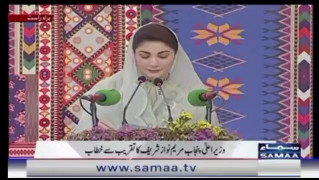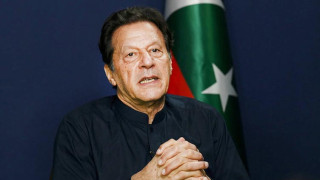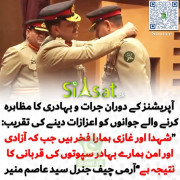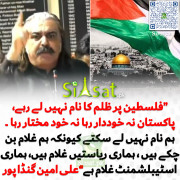There are lot of misconceptions when you compare the situation of East Pakistan to the current political divide. The Bengalis of East Pakistan had very few things common between them and the people of West Pakistan. Their language, cultural values were lot closer to Hindus than with the people of West Pakistan. Beside religion, there is hardly anything you can find which can keep them coexisting with West Pakistan.
Mujeeb exploited those differences to achieve his interest to rule and he never rose above himself to keep the larger interest of nation. It was much easier for him to threaten to breakup the country until and unless the power is not given to him . There is no doubt that he deserved to rule the country as a result of the elections.
Now, the result of those election did nothing to bring stability to the country but caused a bigger rift than it was there to begin with.
As far as I am concerned, I see this as a gross failure of political parties than the army defeat. Had Bhutto not resisted the invitation of Mujeeb for all political candidates to assemble in East Pakistan, we might have avoided the fall of Dhakka. The mistakes were made from both parts, and it was not mere depriving the east Pakistani people their right to govern. Mujeeb was in cahoots with Indians from the day one.
This is why I said that anyone who refused, stop and resist the negotiations and meeting is not really a politician. Politicians meet with their sworn enemy to find the solutions of the problems. Ik being stubborn and totally egotistic, refuse any talk and any viable solution.
I don't think this situation is anywhere critical as we seen back in 1971 except that when you condole violence and burn the properties than force must be used to prevent destruction. Any election under this poisonous environment will only destabilize the country and push it in to a series of crisis. Only solution out is through talk and negotiation.
















.png?Expires=1839520194&Key-Pair-Id=K2ZIVPTIP2VGHC&Signature=a1IfOw7rPLsPwduCLC0E7FdRDbq6Mf8WvfJEpctWRESM-2do0Ie1M77Zr6otd6UwIwQx4WrcuwUoI3FwGpkkYInKjNB4stohYD8LCpw0jZlhYr1sJejuv3z3DglJv72xZeEHyp2BrcC9aFdmY5uIJkfnEnSauR07cxOQ3e4YJcF5~OfEJZAwytwJUIP2uzyxMtMi2wny8qvmWd1dsnmU9PmneSRQKTDu9SRpJcQW46uv-mhgOstiigfC5hAOdZLngiQ1aygUuNqY8cLdqDNLh9UeV-yRw~XfXS1pFQbxA1vXOY0JKYOtl2RH4OLy6pw531nKMZu16v5veBjZzVGJJQ__)













